- Home
- Alfred Bester
Virtual Unrealities: The Short Fiction of Alfred Bester Page 2
Virtual Unrealities: The Short Fiction of Alfred Bester Read online
Page 2
No one knew. The doors were double-locked. No visitors were permitted to enter. No patients were permitted to leave. Physicians were seen to arrive and depart. Their perplexed expressions stimulated the wildest speculations but revealed nothing. The nurses who ministered to Ward T were questioned eagerly but they were closed-mouthed.
There were dribs and drabs of information, unsatisfying and self-contradictory. A charwoman asserted that she had been in to clean up and there had been no one in the ward. Absolutely no one. Just two dozen beds and nothing else. Had the beds been slept in? Yes. They were rumpled, some of them. Were there signs of the ward being in use? Oh yes. Personal things on the tables and so on. But dusty, kind of. Like they hadn’t been used in a long time.
Public opinion decided it was a ghost ward. For spooks only.
But a night orderly reported passing the locked ward and hearing singing from within. What kind of singing? Foreign language, like. What language? The orderly couldn’t say. Some of the words sounded like … well, like: Cow dee on us eager tour …
Public opinion started to run a fever and decided it was an alien ward. For spies only.
St. Albans enlisted the help of the kitchen staff and checked the food trays. Twenty-four trays went into Ward T three times a day. Twenty-four came out. Sometimes the returning trays were emptied. Most times they were untouched.
Public opinion started to run a fever and decided it was a racket. It was an informal club of goldbricks and staff grafters who caroused within. Cow dee on us eager tour indeed!
For gossip, a hospital can put a small town sewing circle to shame with ease, but sick people are easily goaded into passion by trivia. It took just three months for idle speculation to turn into downright fury. In January, 2112, St. Albans was a sound, well-run hospital. By March, 2112, St. Albans was in a ferment, and the psychological unrest found its way into the official records. The percentage of recoveries fell off. Malingering set in. Petty infractions increased. Mutinies flared. There was a staff shake-up. It did no good. Ward T was inciting the patients to riot. There was another shake-up, and another, and still the unrest fumed.
The news finally reached General Carpenter’s desk through official channels.
“In our fight for the American Dream,” he said, “we must not ignore those who have already given of themselves. Send me a Hospital Administration expert.”
The expert was delivered. He could do nothing to heal St. Albans. General Carpenter read the reports and fired him.
“Pity,” said General Carpenter, “is the first ingredient of civilization. Send me a Surgeon General.”
A Surgeon General was delivered. He could not break the fury of St. Albans, and General Carpenter broke him. But by this time Ward T was being mentioned in the dispatches.
“Send me,” General Carpenter said, “the expert in charge of Ward T.”
St. Albans sent a doctor, Captain Edsel Dimmock. He was a stout young man, already bald, only three years out of medical school, but with a fine record as an expert in psychotherapy. General Carpenter liked experts. He liked Dimmock. Dimmock adored the general as the spokesman for a culture which he had been too specially trained to seek up to now, but which he hoped to enjoy after the war was won.
“Now look here, Dimmock,” General Carpenter began. “We’re all of us tools, today—hardened and sharpened to do a specific job. You know our motto: a job for everyone and everyone on the job. Somebody’s not on the job at Ward T and we’ve got to kick him out. Now, in the first place what the hell is Ward T?”
Dimmock stuttered and fumbled. Finally he explained that it was a special ward set up for special combat cases. Shock cases.
“Then you do have patients in the ward?”
“Yes, sir. Ten women and fourteen men.”
Carpenter brandished a sheaf of reports. “Says here the St. Albans patients claim nobody’s in Ward T.”
Dimmock was shocked. That was untrue, he assured the general.
“All right, Dimmock. So you’ve got your twenty-four crocks in there. Their job’s to get well. Your job’s to cure them. What the hell’s upsetting the hospital about that?”
“W-well, sir. Perhaps it’s because we keep them locked up.”
“You keep Ward T locked?”
“Yes, sir.”
“Why?”
“To keep the patients in, General Carpenter.”
“Keep ’em in? What d’you mean? Are they trying to get out? They violent, or something?”
“No, sir. Not violent.”
“Dimmock, I don’t like your attitude. You’re acting damned sneaky and evasive. And I’ll tell you something else I don’t like. That T classification. I checked with a Filing Expert from the Medical Corps and there is no T classification. What the hell are you up to at St. Albans?”
“W-well, sir … We invented the T classification. It … They … They’re rather special cases, sir. We don’t know what to do about them or how to handle them. W-we’ve been trying to keep it quiet until we’ve worked out a modus operandi, but it’s brand-new, General Carpenter. Brand-new!” Here the expert in Dimmock triumphed over discipline. “It’s sensational. It’ll make medical history, by God! It’s the biggest damned thing ever.”
“What is it, Dimmock? Be specific.”
“Well, sir, they’re shock cases. Blanked out. Almost catatonic. Very little respiration. Slow pulse. No response.”
“I’ve seen thousands of shock cases like that,” Carpenter grunted. “What’s so unusual?”
“Yes, sir, so far it sounds like the standard Q or R classification. But here’s something unusual. They don’t eat and they don’t sleep.”
“Never?”
“Some of them never.”
“Then why don’t they die?”
“We don’t know. The metabolism cycle’s broken, but only on the anabolism side. Catabolism continues. In other words, sir, they’re eliminating waste products, but they’re not taking anything in. They’re eliminating fatigue poisons and rebuilding worn tissue, but without food and sleep. God knows how. It’s fantastic.”
“That why you’ve got them locked up? Mean to say … D’you suspect them of stealing food and catnaps somewhere else?”
“N-No, sir.” Dimmock looked shamefaced. “I don’t know how to tell you this, General Carpenter… . We lock them up because of the real mystery. They … Well, they disappear.”
“They what?”
“They disappear, sir. Vanish. Right before your eyes.”
“The hell you say.”
“I do say, sir. They’ll be sitting on a bed or standing around. One minute you see them, the next minute you don’t. Sometimes there’s two dozen in Ward T. Other times none. They disappear and reappear without rhyme or reason. That’s why we’ve got the ward locked, General Carpenter. In the entire history of combat and combat injury, there’s never been a case like this before. We don’t know how to handle it.”
“Bring me three of those cases,” General Carpenter said.
Nathan Riley ate French toast, eggs benedict; consumed two pints of brown ale, smoked a John Drew, belched delicately and arose from the breakfast table. He nodded quietly to Gentleman Jim Corbett, who broke off his conversation with Diamond Jim Brady to intercept him on the way to the cashier’s desk.
“Who do you like for the pennant this year, Nat?” Gentleman Jim inquired.
“The Dodgers,” Nathan Riley answered.
“They’ve got no pitching.”
“They’ve got Snider and Furillo and Campanella. They’ll take the pennant this year, Jim. I’ll bet they take it earlier than any team ever did. By September 13. Make a note. See if I’m right.”
“You’re always right, Nat,” Corbett said.
Riley smiled, paid his check, sauntered out into the street and caught a horsecar bound for Madison Square Garden. He got off at the corner of Fiftieth Street and Eighth Avenue and walked upstairs to a handbook office over a radio repair shop. The bookie glance
d at him, produced an envelope and counted out $15,000.
“Rocky Marciano by a TKO over Roland La Starza in the eleventh,” he said. “How the hell do you call them so accurate, Nat?”
“That’s the way I make a living,” Riley smiled. “Are you making book on the elections?”
“Eisenhower twelve to five. Stevenson—”
“Never mind Adlai.” Riley placed $20,000 on the counter. “I’m backing Ike. Get this down for me.”
He left the handbook office and went to his suite in the Waldorf where a tall, thin young man was waiting for him anxiously.
“Oh yes,” Nathan Riley said. “You’re Ford, aren’t you? Harold Ford?”
“Henry Ford, Mr. Riley.”
“And you need financing for that machine in your bicycle shop. What’s it called?”
“I call it an Ipsimobile, Mr. Riley.”
“Hmmm. Can’t say I like that name. Why not call it an automobile?”
“That’s a wonderful suggestion, Mr. Riley. I’ll certainly take it.”
“I like you, Henry. You’re young, eager, adaptable. I believe in your future and I believe in your automobile. I’ll invest two hundred thousand dollars in your company.”
Riley wrote a check and ushered Henry Ford out. He glanced at his watch and suddenly felt impelled to go back and look around for a moment. He entered his bedroom, undressed, put on a gray shirt and gray slacks. Across the pocket of the shirt were large blue letters: U.S.A.H.
He locked the bedroom door and disappeared.
He reappeared in Ward T of the United States Army Hospital in St. Albans, standing alongside his bed which was one of twenty-four lining the walls of a long, light steel barracks. Before he could draw another breath, he was seized by three pairs of hands. Before he could struggle, he was shot by a pneumatic syringe and poleaxed by 1½ cc of sodium thiomorphate.
“We’ve got one,” someone said.
“Hang around,” someone else answered. “General Carpenter said he wanted three.”
After Marcus Junius Brutus left her bed, Lela Machan clapped her hands. Her slave woman entered the chamber and prepared her bath. She bathed, dressed, scented herself, and breakfasted on Smyrna figs, rose oranges and a flagon of Lacrima Christi. Then she smoked a cigarette and ordered her litter.
The gates of her house were crowded as usual by adoring hordes from the Twentieth Legion. Two centurions removed her chair-bearers from the poles of the litter and bore her on their stout shoulders. Lela Machan smiled. A young man in a sapphire-blue cloak thrust through the mob and ran toward her. A knife flashed in his hand. Lela braced herself to meet death bravely.
“Lady!” he cried. “Lady Lela!”
He slashed his left arm with the knife and let the crimson blood stain her robe.
“This blood of mine is the least I have to give you,” he cried.
Lela touched his forehead gently.
“Silly boy,” she murmured. “Why?”
“For love of you, my lady.”
“You will be admitted tonight at nine,” Lela whispered. He stared at her until she laughed. “I promise you. What is your name, pretty boy?”
“Ben Hur.”
“Tonight at nine, Ben Hur.”
The litter moved on. Outside the Forum, Julius Caesar passed in hot argument with Savonarola. When he saw the litter he motioned sharply to the centurions, who stopped at once. Caesar swept back the curtains and stared at Lela, who regarded him languidly. Caesar’s face twitched.
“Why?” he asked hoarsely. “I have begged, pleaded, bribed, wept, and all without forgiveness. Why, Lela? Why?”
“Do you remember Boadicea?” Lela murmured
“Boadicea? Queen of the Britons? Good God, Lela, what can she mean to our love? I did not love Boadicea. I merely defeated her in battle.”
“And killed her, Caesar.”
“She poisoned herself, Lela.”
“She was my mother, Caesar!” Suddenly Lela pointed her finger at Caesar. “Murderer. You will be punished. Beware the Ides of March, Caesar!”
Caesar recoiled in horror. The mob of admirers that had gathered around Lela uttered a shout of approval. Amidst a shower of rose petals and violets, she continued on her way across the Forum to the Temple of the Vestal Virgins where she abandoned her adoring suitors and entered the sacred temple.
Before the altar she genuflected, intoned a prayer, dropped a pinch of incense on the altar flame and disrobed. She examined her beautiful body reflected in a silver mirror, then experienced a momentary twinge of homesickness. She put on a gray blouse and a gray pair of slacks. Across the pocket of the blouse was lettered U.S.A.H.
She smiled once at the altar and disappeared.
She reappeared in Ward T of the United States Army Hospital where she was instantly felled by 1½ cc of sodium thiomorphate injected subcutaneously by a pneumatic syringe.
“That’s two,” somebody said.
“One more to go.”
George Hanmer paused dramatically and stared around … at the opposition benches, at the Speaker on the woolsack, at the silver mace on a crimson cushion before the Speaker’s chair. The entire House of Parliament, hypnotized by Hanmer’s fiery oratory, waited breathlessly for him to continue.
“I can say no more,” Hanmer said at last. His voice was choked with emotion. His face was blanched and grim. “I will fight for this bill at the beachheads. I will fight in the cities, the towns, the fields, and the hamlets. I will fight for this bill to the death and, God willing, I will fight for it after death. Whether this be a challenge or a prayer, let the consciences of the right honorable gentlemen determine; but of one thing I am sure and determined: England must own the Suez Canal.”
Hanmer sat down. The house exploded. Through the cheering and applause he made his way out into the division lobby where Gladstone, Churchill, and Pitt stopped him to shake his hand. Lord Palmerston eyed him coldly, but Pam was shouldered aside by Disraeli who limped up, all enthusiasm, all admiration.
“We’ll have a bite at Tattersall’s,” Dizzy said. “My car’s waiting.”
Lady Beaconsfield was in the Rolls Royce outside the Houses of Parliament. She pinned a primrose on Dizzy’s lapel and patted Hanmer’s cheek affectionately.
“You’ve come a long way from the schoolboy who used to bully Dizzy, Georgie,” she said.
Hanmer laughed. Dizzy sang: “Gaudeamus igitur… .” and Hanmer chanted the ancient scholastic song until they reached Tattersall’s. There Dizzy ordered Guinness and grilled bones while Hanmer went upstairs in the club to change.
For no reason at all he had the impulse to go back for a last look. Perhaps he hated to break with his past completely. He divested himself of his surtout, nankeen waistcoat, pepper and salt trousers, polished Hessians, and undergarments. He put on a gray shirt and gray trousers and disappeared.
He reappeared in Ward T of the St. Albans Hospital where he was rendered unconscious by 1½ cc of sodium thiomorphate.
“That’s three,” somebody said.
“Take ’em to Carpenter.”
So there they sat in General Carpenter’s office, PFC Nathan Riley, M/Sgt Lela Machan, and Corp/2 George Hanmer. They were in their hospital grays. They were torpid with sodium thiomorphate.
The office had been cleared and it blazed with light. Present were experts from Espionage, Counter-Espionage, Security, and Central Intelligence. When Captain Edsel Dimmock saw the steel-faced ruthless squad awaiting the patients and himself, he started. General Carpenter started grimly.
“Didn’t occur to you that we mightn’t buy your disappearance story, eh Dimmock?”
“S-Sir?”
“I’m an expert too, Dimmock. I’ll spell it out for you. The war’s going badly. Very badly. There’ve been intelligence leaks. The St. Albans mess might point to you.”
“B-But they do disappear, sir. I—”
“My experts want to talk to you and your patients about this disappearing act, Dimmock. They’ll s
tart with you.”
The experts worked over Dimmock with preconscious softeners, id releases, and superego blocks. They tried every truth serum in the books and every form of physical and mental pressure. They brought Dimmock, squealing, to the breaking point three times, but there was nothing to break.
“Let him stew for now,” General Carpenter said. “Get on to the patients.”
The experts appeared reluctant to apply pressure to the sick men and the woman.
“For God’s sake, don’t be squeamish,” Carpenter raged. “We’re fighting a war for civilization. We’ve got to protect our ideals no matter what the price. Get to it!”
The experts from Espionage, Counter-Espionage, Security, and Central Intelligence got to it. Like three candles, PFC Nathan Riley, M/Sgt Lela Machan, and Corp/2 George Hanmer snuffed out and disappeared. One moment they were seated in chairs surrounded by violence. The next moment they were not.
The experts gasped. General Carpenter did the handsome thing. He stalked to Dimmock. “Captain Dimmock, I apologize. Colonel Dimmock, you’ve been promoted for making an important discovery … only what the hell does it mean? We’ve got to check ourselves first.”
Carpenter snapped up the intercom. “Get me a combat-shock expert and an alienist.”
The two experts entered and were briefed. They examined the witnesses. They considered.
“You’re all suffering from a mild case of shock,” the combat-shock expert said. “War jitters.”
“You mean we didn’t see them disappear?”
The shock expert shook his head and glanced at the alienist who also shook his head.
“Mass illusion,” the alienist said.
At that moment PFC Riley, M/Sgt Machan, and Corp/2 Hanmer reappeared. One moment they were a mass illusion; the next, they were back sitting in their chairs surrounded by confusion.
“Dope ’em again, Dimmock,” Carpenter cried. “Give ’em a gallon.” He snapped up the intercom. “I want every expert we’ve got. Emergency meeting in my office at once.”

 Galatea Galante
Galatea Galante Hobson’s Choice
Hobson’s Choice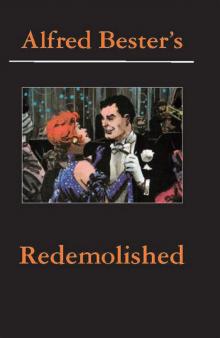 Redemolished
Redemolished The Flowered Thundermug
The Flowered Thundermug The Starcomber
The Starcomber Virtual Unrealities: The Short Fiction of Alfred Bester
Virtual Unrealities: The Short Fiction of Alfred Bester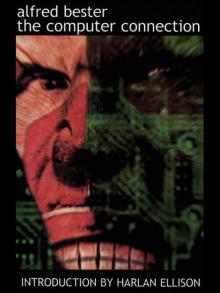 The Computer Connection
The Computer Connection Selected Stories of Alfred Bester
Selected Stories of Alfred Bester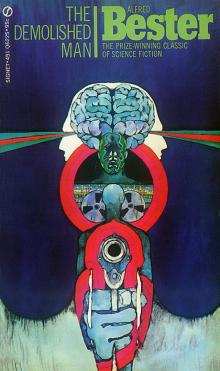 The Demolished Man
The Demolished Man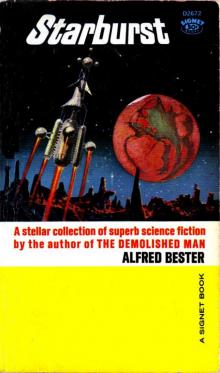 Starburst
Starburst Psychoshop
Psychoshop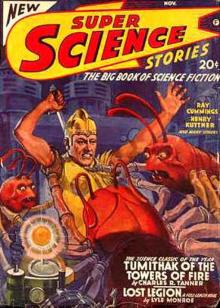 Biped Reegan
Biped Reegan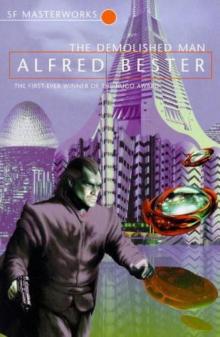 Demolished Man
Demolished Man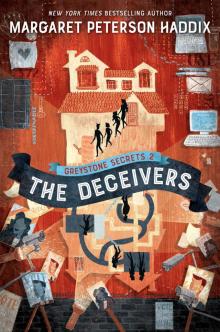 THE DECEIVERS
THE DECEIVERS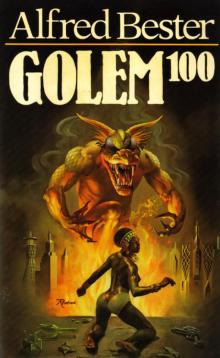 GOLEM 100
GOLEM 100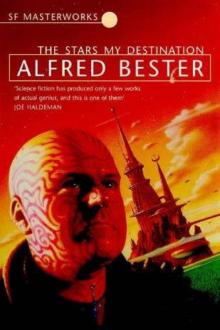 The Stars My Destination
The Stars My Destination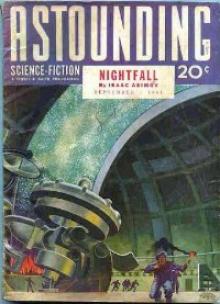 Adam And No Eve
Adam And No Eve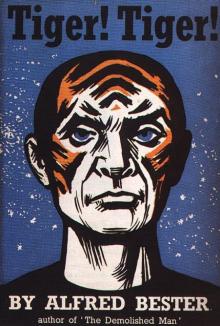 The Stars My Destination ( Tiger! Tiger! )
The Stars My Destination ( Tiger! Tiger! )